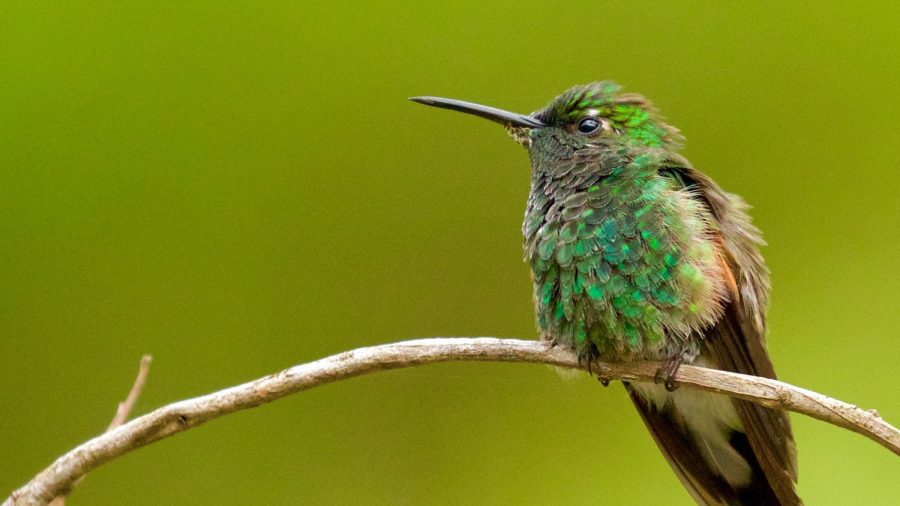A man in Georgia gets a yearly visit from a hummingbird he rescued and nursed back to health years ago.
Former SWAT officer Mike Cardenaz found an injured hummingbird on his porch four years ago, he told WRDW.
“Several of his feathers in his wings were broken off and he couldn’t take flight,” he told the station.
Cardenaz took care of the little bird and nursed it back to health.
Four years ago, Mike Cardenaz rescued an injured hummingbird.
Now it comes back every year to visit its savior.https://t.co/lhEiHuqQMI
— Globalnews.ca (@globalnews) April 30, 2019
“I had to wait until he molted, and regrew new wings. That was 8 weeks. And he became a part of the family,” he said.
He named the hummingbird Buzz and used Pedialyte and sugar to help the injured bird recover, according to WABC.
Hummingbirds eat a lot, consuming up to 12 times their own body weight in nectar each day, according to HummingbirdCentral.com. Their diet consists of “nectar from flowers (red is the favorite color), small insects such as aphids and spiders, and sometimes even pollen and sap,” according to the site.
Eventually, with the tender care Cardenaz gave Buzz, the hummingbird regained its strength.
Hummingbird returns to man who nursed it back to health https://t.co/TgFIcjWyGR
— ABC7 Eyewitness News (@ABC7) April 30, 2019
“He would fly around the yard and come back when he got exhausted because that was his comfort zone until he finally took off for the winter. And he’s been coming back for the last four years,” he said.
When the weather becomes colder, the hummingbird migrates to South America. But every year, the hummingbird has made the journey to Grovetown, Georgia, to visit Cardenaz, according to WABC.
During migration season, hummingbirds can travel up to 23 miles in a day, according to HummingbirdCentral.com. Most hummingbirds spend the winter seasons in Central America or Mexico where the climate is warmer, and then migrate north to the southern U.S. and western states as early as February to their breeding grounds, according to the site.
When asked how he knows it’s the same hummingbird every year, Cardenaz said, “Random hummingbirds don’t land on your hand.”
SO SWEET: “Random hummingbirds don’t land in your hand.” https://t.co/BGpM71WhyB
— WHNT (@whnt) April 30, 2019
According to WorldofHummingbirds.com, hummingbirds are very smart and can “remember every flower they have been to,” which could attest to how the hummingbird is able to remember how to find Cardenaz every year. Hummingbird brains are also quite massive, making up 4.2 percent of its body weight, which is the largest proportion in the bird kingdom, according to the site.
This year, however, Buzz caused some concern as the little bird was late by a week or two.
Late or not, the hummingbird did show up.
“I was kind of worried about him and I was on the front porch, sweeping off the front porch and I felt something zoom around my head. I stood on the front porch, put my hand out, and he landed on my hand,” Cardenaz told the station.
Hummingbird returns to man who nursed it back to health https://t.co/TgFIcjWyGR
— ABC7 Eyewitness News (@ABC7) April 30, 2019
The average lifespan of hummingbirds is between three and five years, with most deaths occurring within the first year, according to WorldofHummingbirds.com. However, some can live more than a decade, with the oldest known hummingbird, a Broad-Tailed Hummingbird, living up to 12 years, according to the site.
While Cardenaz seems tough on the outside, he said he has a softer side, too.
Buzz is the second hummingbird he’s rescued, according to WABC. Currently, he’s helping an injured chipmunk recover.
“That’s what people call me, Dr. Doolittle,” he said.
A man nursed a hummingbird back to health four years ago. That hummingbird migrates south every year, but around Masters time, he always finds his way back, WRDW reported.https://t.co/jcNjylKI1a
— WBTV News (@WBTV_News) April 30, 2019

